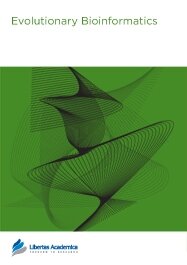

Publication Date: 09 Jan 2012
Type: Original Research
Journal: Evolutionary Bioinformatics
Citation: Evolutionary Bioinformatics 2012:8 89-104
doi: 10.4137/EBO.S8484

Previous comparative genomic studies of genes involved in olfactory behavior in Drosophila focused only on particular gene families such as odorant receptor and/or odorant binding proteins. However, olfactory behavior has a complex genetic architecture that is orchestrated by many interacting genes. In this paper, we present a comparative genomic study of olfactory behavior in Drosophila including an extended set of genes known to affect olfactory behavior. We took advantage of the recent burst of whole genome sequences and the development of powerful statistical tools to analyze genomic data and test evolutionary and functional hypotheses of olfactory genes in the six species of the Drosophila melanogaster species group for which whole genome sequences are available. Our study reveals widespread purifying selection and limited incidence of positive selection on olfactory genes. We show that the pace of evolution of olfactory genes is mostly independent of the life cycle stage, and of the number of life cycle stages, in which they participate in olfaction. However, we detected a relationship between evolutionary rates and the position that the gene products occupy in the olfactory system, genes occupying central positions tend to be more constrained than peripheral genes. Finally, we demonstrate that specialization to one host does not seem to be associated with bursts of adaptive evolution in olfactory genes in D. sechellia and D. erecta, the two specialists species analyzed, but rather different lineages have idiosyncratic evolutionary histories in which both historical and ecological factors have been involved.
PDF (695.89 KB PDF FORMAT)
RIS citation (ENDNOTE, REFERENCE MANAGER, PROCITE, REFWORKS)
Supplementary Files 1 (58.88 KB XLS FORMAT)
BibTex citation (BIBDESK, LATEX)
XML
PMC HTML
This is the fastest progress we have experienced from submission to acceptance. Reviews are fast, pertinent, and instructive. Every step of the process is visible and prompt, and every email is friendly and immediate. In all, it is an excellent experience to be published in Libertas Academica.

All authors are surveyed after their articles are published. Authors are asked to rate their experience in a variety of areas, and their responses help us to monitor our performance. Presented here are their responses in some key areas. No 'poor' or 'very poor' responses were received; these are represented in the 'other' category.See Our Results
Copyright © 2013 Libertas Academica Ltd (except open access articles and accompanying metadata and supplementary files.)
Facebook Google+ Twitter
Pinterest Tumblr YouTube